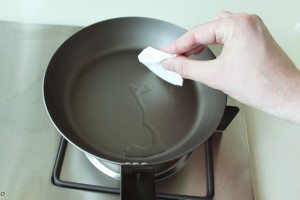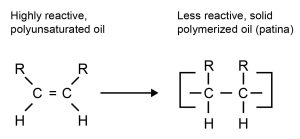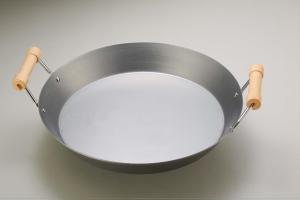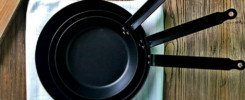The short answer is no, but there are some exceptions.
 On the packaging of most uncoated carbon steel pans is a use and care instruction to wipe some oil on the surface after each use. The main reason to do this is to prevent oxidation, otherwise known as rust, on the pan. For this purpose only it certainly makes sense as the oil does form a barrier between the surrounding air or moisture and the bare steel surface below.
On the packaging of most uncoated carbon steel pans is a use and care instruction to wipe some oil on the surface after each use. The main reason to do this is to prevent oxidation, otherwise known as rust, on the pan. For this purpose only it certainly makes sense as the oil does form a barrier between the surrounding air or moisture and the bare steel surface below.
 However, there is a major disadvantage to doing this: the cold or lukewarm oil added to the pan inhibits the development of the patina. As shown here, a well-developed, dense black patina has numerous benefits for cooking. Not only is its non-stick release excellent, but unlike a chemical non-stick coating, the patina is renewable for long term usage. As explained in the previous post, for a patina to be properly developed on a steel surface it needs to go through a 3-step process: cracking; polymerization and carbonization. If the oil does not polymerize properly then it has not completly bonded together, and then if the carbonization process is not finished then the solid film of oil has not connected with the steel effectively. But for this process to be completed both the oil needs to be heated above its smoke point and for a long enough time that all 3 steps in the process can be completed. This can only happen with heat, and a lot of it.
However, there is a major disadvantage to doing this: the cold or lukewarm oil added to the pan inhibits the development of the patina. As shown here, a well-developed, dense black patina has numerous benefits for cooking. Not only is its non-stick release excellent, but unlike a chemical non-stick coating, the patina is renewable for long term usage. As explained in the previous post, for a patina to be properly developed on a steel surface it needs to go through a 3-step process: cracking; polymerization and carbonization. If the oil does not polymerize properly then it has not completly bonded together, and then if the carbonization process is not finished then the solid film of oil has not connected with the steel effectively. But for this process to be completed both the oil needs to be heated above its smoke point and for a long enough time that all 3 steps in the process can be completed. This can only happen with heat, and a lot of it.
So with all of this information in mind, can wiping a highly reactive, unsaturated fat onto a pan, which is at nowhere near the necessary temperature for the seasoning process to occur, be good for the development of the patina? In the kitchen a cook always keeps the oil in a dark, dry place in a sealed container. The reason for this is because they know that if they don’t then the main enemies of oil, light and oxygen, will react with it and the oil will go rancid. So why would oil, which has not had its molecualar make-up changed with heat during the seasoning process, not also go rancid on the pan? Oil that does go rancid will not only cover the patina that has been developed from continual cooking usage, but it would also become sticky. So in fact, although a Professional Grey Steel pan may have little or no non-stick release after the first time of use, but if you were to wipe oil on it afterwards then you would make it become a ‘stick’ pan instead.
It should be noted that this discussion is only relevant to grey carbon steel pans. Since black steel has a natural black oxide layer, this naturally occuring layer of iron produced during the steel making process, provides the buffer between the atmosphere and the iron in the steel. However, even with a grey steel pan with constant cooking usage a barrier to oxidation will occur to prevent oxidation. For the interior of the pan the patina will do this job, and for the exterior of the pan a passivation process, called bluing, will develop over the steel which also reduces the chances of rust developing.*
 However, there are some grey steel pans, such as a crepe pan or paella pan, that because they are only used for particular types of cooking will not be cooked with that often to develop a layer of corrosion resistance. So for these pans it might well be necessary to wipe a layer of oil on the pan after each use, otherwise they will be prone to rust quite a lot. Although for a pan, such as a paella pan, a layer of oil over some areas of developed patina is not so disadvantageous because as explained here, for Socarrat to form in the paella you actually want some sticking. Also, for a crepe pan quite often butter is added before the mixture is poured on to the pan for extra flavour and this fat will provide the necessary non-stick release.
However, there are some grey steel pans, such as a crepe pan or paella pan, that because they are only used for particular types of cooking will not be cooked with that often to develop a layer of corrosion resistance. So for these pans it might well be necessary to wipe a layer of oil on the pan after each use, otherwise they will be prone to rust quite a lot. Although for a pan, such as a paella pan, a layer of oil over some areas of developed patina is not so disadvantageous because as explained here, for Socarrat to form in the paella you actually want some sticking. Also, for a crepe pan quite often butter is added before the mixture is poured on to the pan for extra flavour and this fat will provide the necessary non-stick release.
* Of course, other than cooking a lot with a Professional Steel pan, there are other ways to prevent rust from forming on the pan. How the pan is stored when not in use is important. If possible hanging the pan is preferable, this way it is easier to monitor the surface to see if any rust does develop. If you cannot hang the pan then storing it a cupboard with a dry kitchen cloth over it should be sufficient to prevent corrosion. Also, using salt for cleaning, as well as heating the pan over the stove after cleaning to remove any remaining moisture should help keep the pan rust-free.
